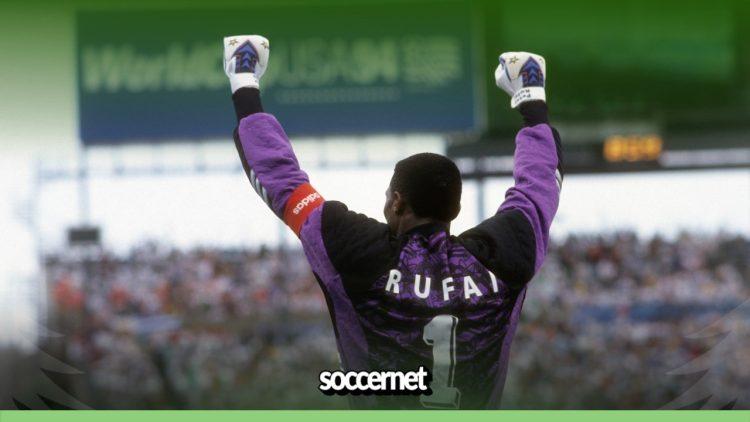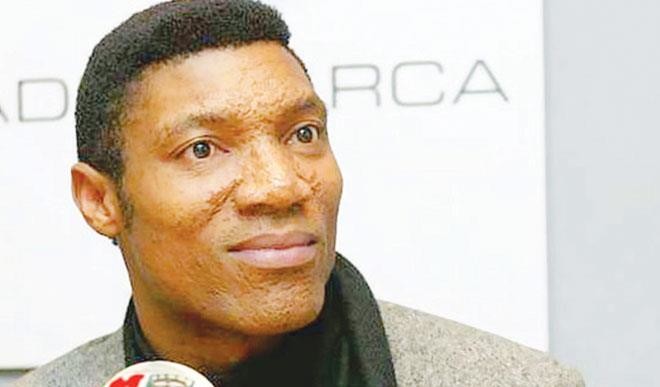Death of Nigerian Football Legend Peter Rufai

Nigeria is mourning the profound loss of Peter Rufai, the legendary former Super Eagles goalkeeper, who passed away at the age of 61 after a period of illness. Widely recognized by his iconic nickname "Dodo Mayana," Rufai was a towering and inspirational figure for Nigeria's golden generation of football in the 1990s. His legacy is etched in the memories of fans for his safe hands, commanding presence, and calm demeanor between the posts. His death has prompted an outpouring of tributes from former teammates, current players, and fans across Nigeria and beyond, with many recalling his awe-inspiring performances and unique personality.
Born on August 24, 1963, in Lagos, Peter Rufai's early life was marked by an unexpected journey into goalkeeping and a significant family decision during the Nigerian civil war. His father was a king in Idimu, Lagos, and his mother hailed from Port Harcourt. After some years in Lagos, he moved to Kaduna with his mother, where he first discovered his love for football, often forgetting food money for the game. During the civil war in 1967, his mother relocated with him to Port Harcourt, then under Biafran control. To protect him from retaliatory attacks due to his father's Yoruba heritage, his mother renamed him "Peter," dropping his Yoruba name. His path to becoming a goalkeeper was accidental; during an inter-school match with a tied score, the team's original goalkeeper stormed off, and Rufai, then a midfielder, stepped in. His raw talent for stopping shots with his entire body led his teammates to insist he remain the goalkeeper, marking the beginning of his illustrious career.
Rufai's professional football career began at 17, when he was scouted by Sharks FC and later joined Stationery Stores FC of Lagos. Despite losing the 1980 FA Cup final with Stationery Stores, he was instrumental in their run to the 1981 CAF Winners' Cup final, where he saved a crucial penalty before an injury forced him out of the return leg. His international debut for the Green Eagles came in December 1981. A trailblazer, Rufai became the first-ever Nigerian goalkeeper to play professionally abroad, signing with Dragon FC of the Republic of Benin in 1985. He then spent six years in Belgium with K.S.C. Lokeren Oost-Vlaanderen and K.S.K. Beveren, further cementing his status as a pioneer for Nigerian players overseas. He later played in the Netherlands, Spain, and Portugal.
Peter Rufai was a fundamental part of the Super Eagles' 1994 Africa Cup of Nations (AFCON) winning squad, often hailed as Nigeria's golden football generation. At the tournament in Tunisia, he did not concede a goal until the semi-final against Côte d’Ivoire, where his penalty save allowed Rashidi Yekini to secure Nigeria's place in the final. His acrobatics in the 1994 AFCON final against Zambia were as crucial to the victory as Emmanuel Amuneke's goals. Rufai also captained Nigeria in the country’s debut at the FIFA World Cup in 1994, where the team topped a group including Argentina, Bulgaria, and Greece. He returned as the team's goalkeeper at the 1998 World Cup before retiring from the national team. His charisma was as legendary as his saves; he brought beauty, eccentricity, and color to the goalkeeper position, leaping like a "deranged cat" and dancing in the face of danger, all while sporting his signature punk hairstyle.
After his retirement, Rufai chose not to pursue an ancestral throne offered after his father's death in 1998, opting instead to continue his football career in Europe. He stayed abroad for years, pursuing further education and working as a sports administrator. In 2003, he settled in Spain, opening a goalkeeper's school. Upon returning to Nigeria, he dedicated his life to youth development, establishing a football program to discover and nurture young talent across the country, fulfilling his desire to give back to the nation. The Nigeria Football Federation has described Rufai as a "giant of Nigerian football," emphasizing that his legacy "lives on between the sticks and beyond." His passing is another heartbreaking loss for the iconic 1994 AFCON-winning squad, following other beloved figures like Stephen Keshi and Rashidi Yekini.
You may also like...
Diddy's Legal Troubles & Racketeering Trial

Music mogul Sean 'Diddy' Combs was acquitted of sex trafficking and racketeering charges but convicted on transportation...
Thomas Partey Faces Rape & Sexual Assault Charges

Former Arsenal midfielder Thomas Partey has been formally charged with multiple counts of rape and sexual assault by UK ...
Nigeria Universities Changes Admission Policies

JAMB has clarified its admission policies, rectifying a student's status, reiterating the necessity of its Central Admis...
Ghana's Economic Reforms & Gold Sector Initiatives

Ghana is undertaking a comprehensive economic overhaul with President John Dramani Mahama's 24-Hour Economy and Accelera...
WAFCON 2024 African Women's Football Tournament

The 2024 Women's Africa Cup of Nations opened with thrilling matches, seeing Nigeria's Super Falcons secure a dominant 3...
Emergence & Dynamics of Nigeria's ADC Coalition

A new opposition coalition, led by the African Democratic Congress (ADC), is emerging to challenge President Bola Ahmed ...
Demise of Olubadan of Ibadanland
Oba Owolabi Olakulehin, the 43rd Olubadan of Ibadanland, has died at 90, concluding a life of distinguished service in t...
Death of Nigerian Goalkeeping Legend Peter Rufai

Nigerian football mourns the death of legendary Super Eagles goalkeeper Peter Rufai, who passed away at 61. Known as 'Do...


